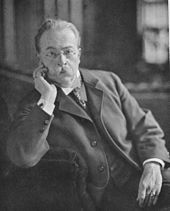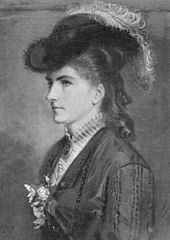Ernst von Wildenbruch

Ernst Adam von Wildenbruch (born February 3, 1845 in Beirut , Ottoman Empire , † January 15, 1909 in Berlin ) was a German writer and diplomat .
family
Ernst von Wildenbruch was the son of the Prussian consul general in Beirut and later Prussian lieutenant general Louis von Wildenbruch (1803–1874), who was an illegitimate offspring of Prince Louis Ferdinand of Prussia from a liaison with Henriette Fromme (born February 12, 1783 in Berlin; † 1828 in Königsberg ) was. The children of this liaison, son Louis and daughter Blanka, were born on March 3, 1810 by King Friedrich Wilhelm III. raised to the Prussian nobility under the name of Wildenbruch . Louis von Wildenbruch grew up as the foster son of his uncle, Prince Anton Radziwiłł (1775–1832) and his wife, Princess Luise of Prussia (1770–1836), who was a sister of Prince Louis Ferdinand, who fell in 1806 before Saalfeld . In the Radziwiłłschen house, Louis von Wildenbruch met his foster mother's lady-in-waiting, Ernestine von Langen , whom he married on August 9, 1837. From this marriage, Ernst and five other siblings emerged:
- Luise Rahel (born April 28, 1838 in Berlin, † December 20, 1918 in Klein-Öls ) ∞ Count Paul Yorck von Wartenburg
- Margarete (born June 2, 1839 in Berlin; † July 1, 1839 there)
- Berta (born July 5, 1841 in Berlin, † July 29, 1843 in Syria)
- Heinrich Emin (born October 21, 1842 in Beirut, † March 14, 1893 in Berlin), Prussian colonel à la suite of the General Staff
- Ludwig (born April 8, 1846 in Beirut, † June 26, 1930 in Berlin), Prussian lieutenant general
Ernst von Wildenbruch married Maria Karoline Freiin von Weber on April 12, 1885 in Berlin (born February 23, 1847 in Chemnitz, † July 1, 1920 in Weimar), a granddaughter of the composer Carl Maria von Weber and daughter of the railway pioneer Max Maria von Weber . The marriage remained childless.
Life
After stays in Athens and Constantinople , the family settled in Berlin in 1857, where Ernst von Wildenbruch attended the French grammar school. In 1859 he joined the cadet corps , which he finished in 1863 with an officer's license. From 1863 to 1865 he served as a lieutenant in the 1st Guards Regiment on foot in the Prussian Army in Potsdam . Then he quit active military service and over the next two years made up his Abitur at the high school in Burg near Magdeburg , before studying law in Berlin from 1867 to 1870 . In 1866 and 1870/71 he took part in the wars against Austria and France as a reserve officer . From 1871 he was a trainee lawyer at the Court of Appeal in Frankfurt (Oder) and passed his second state examination in 1876. In 1877 he was first judge at the Eberswalde District Court and the City Court of Berlin for a few months . Then he got a job in the legal department of the Foreign Office and was promoted to the Secret Legation Council in 1897 . In 1897 he supported the petition initiated by Magnus Hirschfeld to the Reichstag to abolish paragraph 175 of the penal code.
In 1907 he moved to Weimar into a villa (' Haus Ithaka ') designed by the architect Paul Schultze-Naumburg , after having regularly spent several months a year in Weimar since 1892.
Services
Wildenbruch's oeuvre includes numerous ballads, dramas, novels and stories. He is a major exponent of the great Wilhelminian historical drama of the 1880s and the nationalistic Bismarckian poetry from around 1900.
His estate is in the Goethe and Schiller Archive in Weimar and in the archive of the Berlin-Brandenburg Academy of Sciences and Humanities in Berlin; his library is a special collection in the Central and State Library in Berlin . He is buried in the historical cemetery in Weimar . The tomb in the form of a Doric temple was designed by Paul Schultze-Naumburg , and it was executed by the sculptor Gustav Sachse in Weimar in 1909 . The bronze plate with the sower inside was created by the sculptor Georg Kolbe (1877–1947).
At the beginning of the First World War , the sculptor Richard Engelmann created a monumental monument in Weimar, which was temporarily removed in the GDR and is now visible again to visitors in the immediate vicinity of the cemetery.
Awards and honors
- 1884: Grillparzer Prize , Schiller Prize
- 1889: Honorary doctorate from the University of Jena
- 1896: Schiller Prize on the intervention of Emperor Wilhelm II.
Works (in selection)
- Songs and chants . Stilke & Weyden, Berlin 1877. VIII, 242 p. ( Digitized version )
- Deep water . Five stories. Freund & Jeckel, Berlin 1898. ( digitized version ) (9th thousand 1916)
- Under the scourge . (Narration) (1901)
- Vionville . A hero song in 3 chants. Stilke, Berlin 1873. ( digitized version )
- Sedan . Waldmann, Frankfurt a. O. 1875. ( digitized version )
- The Master of Tanagra . An artist story from old Hellas. Freund & Jeckel, Berlin 1880. ( digitized version ) 11th edition, new edition. With pictures by Franz Stassen . Grote, Berlin 1913. 185 pp.
- Harold . Tragedy in five acts. Freund & Jeckel, Berlin 1882. ( Digitized 3rd edition 1883 )
- Christoph Marlow . Tragedy in four acts. Freund & Jeckel, Berlin 1884. ([digitized version])
- The Quitzows . Play in four acts. Freund & Jeckel, Berlin 1888. ( digitized version )
- The noble blood . Narrative. Freund & Jeckel, Berlin 1893. ( digitized version of the 18th edition, 1893 ) In standard German shorthand. F. Schulze, Berlin 1926. 80 pp.
- The astronomer . Narrative. Freund & Jeckel, Berlin 1887. ( digitized version )
- Heinrich and Heinrich's family . Tragedy in two evenings. Freund & Jeckel, Berlin 1895. ( digitized version )
- The German drama. Its development and its current status . Publishing house for literature, art and music, Leipzig 1899. ( digitized )
- Leaves from the tree of life . Preface by Berthold Litzmann . Grote, Berlin 1910. IX, 484 pp.
- Young souls . Three stories. With drawings by Hans Baluschek . Grote, Berlin 1916. 121 pp.
-
Children's tears . Two stories. Book decorations by Heinrich Vogeler-Worpswede . Grote, Berlin 1905. 121 pp.
- Children's tears . Two stories. With a note from Heinrich Brinker. With drawings by Hans Baluschek . New edition. Grote, Berlin 1916. 121 pp.
- Collected Works . Edited by Berthold Litzmann . 16 vols. Berlin: Grote 1911–1924
- The hunter . 1st - 5th thousand. Verlag des Volksbildungsverein, Wiesbaden 1927. 102 p. (Wiesbadener Volksbücher, No. 207)
Stage works (selection)
- The Philologists on Parnassus or The Vivisectors . A satyr game. Stilke & Weyden, Berlin 1869. 56 pp.
- Wildenbruch - Cycle , 1st evening: The Menonite . Tragedy in four acts (1881).
- Wildenbruch cycle , 2nd evening: The Carolingians . Tragedy in five acts (1881).
- Wildenbruch - cycle , 3rd evening: The Quitzows . Patriotic drama in four acts. (1888?)
- Wildenbruch - Cycle , 5th evening: The songs of Euripides . Play in three acts, with music by Ferdinand Hummel .
- Wildenbruch - cycle , 6th evening: The German King . Play in five acts.
- The crested lark . Play in four acts (1890). 5th edition. Grote, Berlin 1910. 177 pp.
- The witch's song . Ballad. (Music: Max von Schillings , op.15; 1902/03, for speaker and orchestra (or piano), text: Ernst v. Wolzüge). Screeched and ill. by Johann Holtz . Reichsdr., Berlin 1911. 15 sheets.
- The Rabensteinerin . Play in four acts (1907). (Special performance for the best of the Wildenbruch Monument Fund, Schauspielhaus, Berlin on October 29, 1911)
- Fathers and sons . Play in five acts. Popular edition. Grote, Berlin 1912. 144 pp.
- The new master . Acting in 7 operations. Grote, Berlin 1913. 221 pp.
- Young - Olaf . Ballad. (Music: Max von Schillings, op. 28. Ballade for speaker and orchestra (or piano), text: Ernst von Woliehen). 1914
literature
- Paul Blumenthal: Memories of Ernst von Wildenbruch. Publishing house of the literary society. Frankfurt / Oder 1924.
- Hanns Martin Elster: Ernst von Wildenbruch. Life, work, personality. Grote. Berlin 1934.
- Albert Fries: Observations on Wildenbruch's style and verse. (Germanic studies; 10). Kraus reprint. Nendeln / Liechtenstein 1967 (reprint of the Berlin 1920 edition).
- Torsten Leutert: Ernst von Wildenbruch's historical dramas. (European university publications; 1/1902). Long. Frankfurt am Main 2004. ISBN 3-631-53116-8 .
- Berthold Litzmann: Ernst von Wildenbruch and the national idea. (German speeches in difficult times; 12). Hey man. Berlin 1914.
- Berthold Litzmann: Ernst von Wildenbruch. Grote. Berlin 1913-1916.
- Volume 1: 1845-1885. 1913.
- Volume 2: 1885-1909. 1916.
- Anne-Marie Morisse: The epic art and art technique of Ernst von Wildenbruchs. Georgi Publishing House. Bonn 1912.
- Ulrich Moritz : Ernst von Wildenbruch. Weimar Classic Foundation. Weimar 1995. ISBN 3-7443-0114-1 .
- Julius Röhr: Wildenbruch as a playwright. Critical Investigations. Duncker. Berlin 1908.
- Feodora Schlosser: Ernst von Wildenbruch as a child psychologist. Literary psychological study. Rhenania publishing house. Bonn 1919.
- Johannes E. Schmidt (author), Rüdiger R. Fock (ed.): The French Cathedral School and the French Gymnasium in Berlin. Student memories 1848–1861. Publishing house Dr. Kovac. Hamburg 2008. ISBN 978-3-8300-3478-0 .
- Hans Rudolf Wahl: The Religion of German Nationalism. A study of the history of mentality on the literature of the Empire: Felix Dahn , Ernst von Wildenbruch, Walter Flex . (New contributions from Bremen; 12). Winter. Heidelberg 2002. ISBN 3-8253-1382-4 .
- Johannes Hürter (Red.): Biographical Handbook of the German Foreign Service 1871 - 1945. 5. T - Z, supplements. Published by the Foreign Office, Historical Service. Volume 5: Bernd Isphording, Gerhard Keiper, Martin Kröger: Schöningh, Paderborn et al. 2014, ISBN 978-3-506-71844-0 , p. 282 f.
Web links
- Literature by and about Ernst von Wildenbruch in the catalog of the German National Library
- Works by and about Ernst von Wildenbruch in the German Digital Library
- Works by Ernst von Wildenbruch in the Gutenberg-DE project
- Wildenbruch manuscripts in German-language archives and libraries
Individual evidence
- ↑ Family Tables for Carl Maria von Weber , accessed on January 7, 2017
- ↑ Sontheimer and: EXHIBITIONS: urnings and Uranier . In: Der Spiegel . No. 20 , 1997 ( online ).
| personal data | |
|---|---|
| SURNAME | Wildenbruch, Ernst von |
| ALTERNATIVE NAMES | Wildenbruch, Ernst Adam von (full name) |
| BRIEF DESCRIPTION | German writer and diplomat |
| DATE OF BIRTH | February 3, 1845 |
| PLACE OF BIRTH | Beirut , Ottoman Empire |
| DATE OF DEATH | January 15, 1909 |
| Place of death | Berlin |



